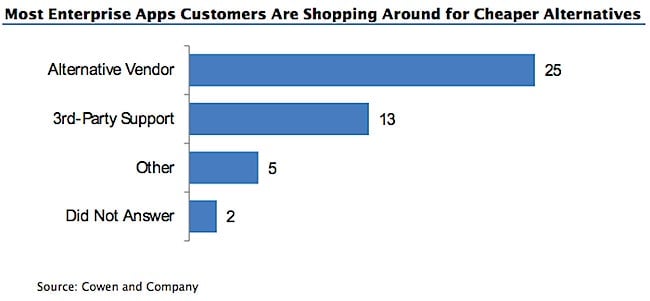85% of top IT executives consider abandoning Oracle’s pricey contracts
Oracle is a $156 billion corporate IT company with a big problem on its hands: in a recent survey of senior information-technology executives in charge of IT budgets greater than $50 million, 85% are trying to figure out how to get out of expensive license agreements with Oracle, reports the Register.


Oracle is a $156 billion corporate IT company with a big problem on its hands: in a recent survey of senior information-technology executives in charge of IT budgets greater than $50 million, 85% are trying to figure out how to get out of expensive license agreements with Oracle, reports the Register.
Known as “enterprise license agreements” (ELAs), the contracts specify that if a customer changes the software or support provider for one of the many Oracle products large businesses typically pay for, the customer still owes Oracle the same amount of money. That’s because ELAs are company-wide licenses that cover the totality of Oracle products a customer uses. As a result, many large corporations have had little incentive to explore alternatives to Oracle, until now.
With cloud-based service providers like Salesforce.com offering cheaper alternatives, Oracle could be in trouble. Of the 85 leading IT executives surveyed by investment bank Cowen and Company, at least a quarter aren’t just thinking about getting out of Oracle’s expensive all-you-can-eat contracts, they’re actually looking at switching to one of the company’s competitors.

So far, Oracle’s revenue has yet to reflect this sentiment–third-quarter results showed stronger-than-expected sales of licenses for the company’s business databases. Oracle also has a powerful lock on existing customers, who have spent years, and in some cases decades, building mission-critical services around Oracle’s services. Getting that data out, and reconstituting it with a competitor, is a considerable headache that could keep Oracle living off a steady stream of corporate licenses for years to come, even if future sales reflect the intentions of the IT executives in the survey.